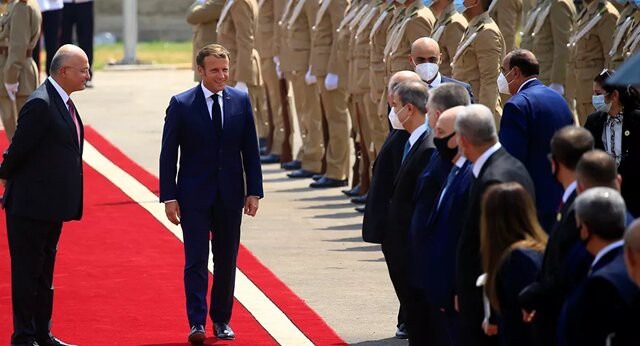Speaking to the website of the Strategic Council on Foreign Relations, Ahmad Dastmalchian referred to the interventionist remarks of the French President in the second emergency meeting on Lebanon and said: Since the time the Middle East colonialism divided countries, France has considered Syria, Lebanon and the Levant as its share under the Sykes-Picot agreement, and has had a strong presence in the region since then and is still trying to maintain its traditional influence.
Saying that the French, in alliance with the Maronites with whom they are aligned and have the same religion, are trying to maintain their presence in Lebanon, he added: France, by understanding the recent movements that are taking place in Lebanon based on the demands and needs of the country intends to ride on the waves. In fact, in order to get out of the current situation that has led to the stalemate Lebanon needs to have a revision in terms of structure in the old structure that is the legacy of French colonialism.
France making attempt to take advantage of Lebanon’s political situation
The analyst of the Middle East affairs described the formation of the Lebanese-Lebanese dialogue as a way out of any deadlock and for the creation of new structures, saying: But France, realizing the situation, intends to impose itself on the negotiations by riding on the waves.
Pointing to Macron’s threats that they would not back down from the need for the reform in Lebanon and that providing international assistance requires the realization of such demands, Dastmalchian said: If France intends to implement any action in Lebanon by imposing its views and conditions, it will undoubtedly fail; because such interferences in Lebanon’s internal affairs undermines Lebanon’s independence and its resistance to pressure.
He pointed to the external pressures for the formation of a government in Lebanon with a specific arrangement, adding: What France is proposing is completely contrary to the goals of changing the structure or the Lebanese-Lebanese talks. Mr. Macron has entered the Lebanese arena with the false hope that he can take effective measures in the interest of France. They intend to diminish the resistance and its role on the Lebanese scene or give an additional role to their Maronite supporters.
Dastmalchian stressed: This is not something that can be done in Lebanon; because the equations and balance of power in that country are very delicate and no country or force can upset it; as those equations are derived from the role of local and regional powers. Therefore, the current form of Lebanon and the powers that dominate it are not as such that France alone can take specific and effective measures about it, and such efforts will definitely fail.
The former Iranian diplomat referred to Macron’s remarks that Lebanese politicians should form a new government as soon as possible otherwise there would be no aid to Lebanon and said increase in the pressures is predictable until Trump’s presence in the White House with an aim of forming their favourite government. He further continued: The only way for Lebanon to succeed and get out of the current impasse is that influential forces in Lebanon start their own national and internal negotiations, and influential countries by understanding the situation, and through consensus and accompaniment help the Lebanese-Lebanese talks. Otherwise, if there is direct intervention in that country, it will surely fail.
French roadmap, a clear interference in Lebanon’s internal affairs
Dastmalchian commented on the French president’s remarks that Lebanon had taken no step for the implementation of the French roadmap for reform and while stressing that its literature was colonial, noted: The roadmap that France has drawn is a clear interference in Lebanon’s internal affairs. They intend to ignore the undeniable power of the core of the Resistance in Lebanon. As the United States has done so. In fact, France intends to be the executive instrument for the US sanctions against the Resistance and Hezbollah.
He stressed: Hezbollah and the Resistance are an objective, strong and effective reality in the Lebanese equations, and how can this role and presence be ignored and weakened? These conditions are the same instrument for the implementation of US sanctions, which of course, will not work out given the balance of power in Lebanon.
Insecurity in Lebanon consequence of power vacuum
Regarding the consequences of these interventions in the internal affairs of Lebanon, the former Iranian diplomat said: One of the most important consequences that the inappropriate measures of France may cause in Lebanon is to make Lebanon insecure due to the power vacuum and problems in providing services to the people. As this situation continues, there is a possibility that Lebanon becomes insecure and the government fails in taking the responsibility for establishing security. Lebanon’s insecurity will definitely affect the region in some way and this insecurity will spread even to the European countries as well.
Emphasizing that such insecurity will take its toll, Dastmalchian added: Lebanon should not become insecure and unstable, and attempts to intervene in the country and prevent the formation of a government according to the will of the Lebanese groups are a wrong and harmful measure.










0 Comments